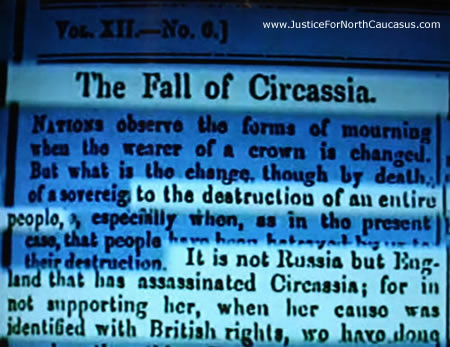The Circassian Question Still Unresolved
By: Adel Bashqawi
22 / 2 / 2022
It’s weird to face contradictions that express distortion of the truth and reality, especially when they are nothing but attempts to pass through problems unnoticed and tragedies without examining their essence and repercussions. Even proving the inability to try to solve it if its existence is acknowledged.
It is no coincidence that articles are published regularly in the form of research and studies beside other formats, issued by official or semi-official Russian institutions, in attempts of distortion and alienation in order to avoid putting the record straight and/or connecting the dots. These attempts aim to mention part of the chronic problems in a deliberate effort to shuffle the papers and even camouflage the facts.
This unsurprisingly evolves from time to time on a continuous and increasing basis, as academic publications or propagandist media type articles and even videos, but misrepresentation in different languages, seeking to cause division and thus to change the facts and spread misinformation by defaming individuals and nations.
Analyzing Circassians Across the Borders
This is not an opportunity or an occasion to create contradictions in the Circassian positions that may lead to what has ominous consequences, whether in the homeland or in the diaspora. It should not be taken as a non-constructive criticism that can create profound differences, while that may be understood as such, because this will only be in the interest of creating a conflict in the Circassian ranks that may lead to unforeseen vicissitudes.
A dear sister has brought to my attention an astounding article in the title of “CIRCASSIANS IN RUSSIA AND TURKEY: DIVIDED ETHNIC GROUP FROM SELF-CONSCIOUSNESS TO CONSOLIDATION” that is signed by: Tatiana N. Litvinova and David G. Bdoyan and published by “Moscow State Institute of International Relations.” [1]
The objective seems to be vague, even though the article refers to unfamiliar ideas in articles issued by official or semi-official bodies. However, commenting on the title and content of the article, the two authors and the publishing institution should draw attention to the fact that the problems experienced by the Circassian diaspora as well as the Circassians in the homeland are a result of the Russian-Circassian war, and its disastrous repercussions, which the successive Russian regimes did not bother to think about solving in line with humanitarian standards, and the international laws and norms.
The article refers to unfamiliar ideas in articles issued by the “most conventional of Russian commentators.” It compares two opposing tendencies and thinking concepts in the Diaspora and in Russian study institutions. The article states: “Their history and social activity at present became the subject of research after the collapse of the USSR. One of the latest books devoted to this people written by Adel Bashqawi (2019) depicted Circassians as an ethnic group, which preserved their identity {for the duration of both tyrant tsarist imperial and Soviet/Communist eras} and only in the 1990s {started to become enlightened with information.}”
Concerning the subject matter, a Window on Eurasia synchronously touched on the same topic, and stated: “Sometimes it is important because the authors try to present an objective picture rather than extend a tendentious one.” Quoting the same article, the “WoE” concluded that the referred topic covered the Circassians both in their homeland and in the Turkish diaspora for:
— “It is written by two MGIMO scholars.”
— “It navigates through the minefield of an issue where most writers choose one side or the other and attack those who do not agree with them,” and they draw on writers as diverse as two opposing sides, one of them is the Circassian writers and the other is “the most conventional of Russian commentators”.
— “it presents a conclusion that is all the more impressive because of the first two reasons. The authors argue that the Circassian movement within Russia and in the diaspora abroad is coming together and acknowledge that this poses a challenge to Moscow.” [2]
The article considers that this shift “represents a sea change in the Russian approach to the Circassian issue … at least some in Moscow are looking for more adequate descriptions of reality.”
Seemingly, it tends to indicate that “there may be some unexpected movements on the Circassian issue in the coming months.” This may lead towards declaring “a single Circassian nation.” [2]
Conclusion
It is appropriate in this regard to borrow the words of Albert Einstein: “We cannot solve our problems with the same thinking we used when we created them.”
***************
References
[1] https://kirj.ee/wp-content/plugins/kirj/pub/TRAMES-4-2021-421-435_20211118145711.pdf
[2] http://windowoneurasia2.blogspot.com/2022/01/moscow-scholars-see-circassian-movement.html

